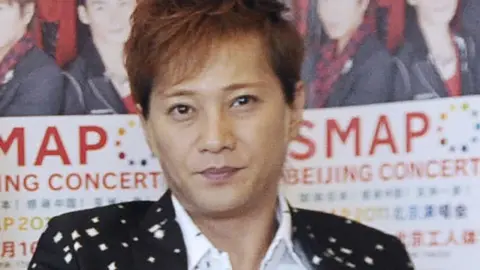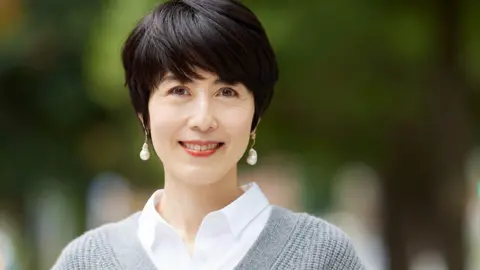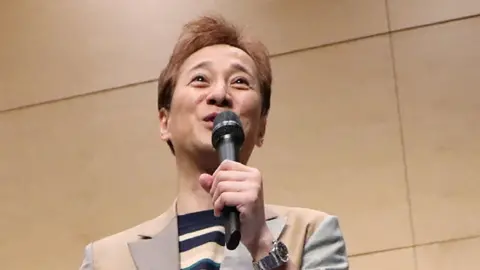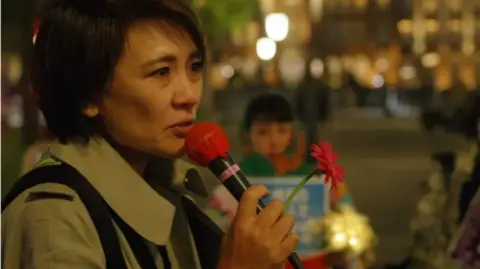Is the downfall of a Japanese star a turning point for women's rights?
 AP
APFor months, Japan's entertainment industry has been rocked by a scandal that unseated one of its most popular celebrities and put one of its biggest broadcasters at risk.
But some believe it has also marked a turning point in how cases of sexual assault are perceived in Japan - where traditionally victims have been shamed into silence.
At its heart was Masahiro Nakai, a household name and leading presenter for Fuji TV, one of the country's biggest broadcasters.
Nakai, who is also a former member of J-pop boy band SMAP, was accused of sexually assaulting a woman at a dinner party in 2023.
The revelations, which appeared last December in the weekly tabloid magazine Josei Seven and were then picked up by the Shukan Bunshun, marked the latest of a series of scandals involving celebrities in Japan, including that of late entertainment mogul Johnny Kitagawa, who was found by investigators to have abused hundreds of boys and young men over six decades.
Nakai didn't admit guilt and denied using force against the woman. But he apologised for "causing trouble" in a statement and said that he had "resolved" the matter in a settlement, reportedly worth more than half a million dollars.
But as public anger mounted, he was forced to announce his retirement from the entertainment industry in January. Another channel, the Tokyo Broadcasting System, has also stopped airing a program that Nakai regularly appeared on as an MC.
The impact on Fuji TV has been devastating.
The broadcaster's reputation is now in ruins. Its revenue is under threat and some of its top executives have also been forced to step down.
High-profile companies like Nissan and Toyota were among those who pulled advertising from the broadcaster as outrage grew. Fuji TV has since admitted it allowed Nakai to continue presenting shows even after finding out about the allegations.
'Keep silent to keep your job'
"If this had happened 10 years ago, there would not have been this outcry," Keiko Kojima, who worked in Japan's media industry for 15 years as a TV presenter, told the BBC.
Sexual violence against women is one of Japan's worst-kept secrets. A 2020 survey claimed that more than 70% of sexual assaults in the country go unreported. And according to a 2024 study published in the International Journal of Asian Studies, for every 1,000 rapes in Japan, only 10–20 result in a criminal conviction – and fewer than half of convicted rapists are incarcerated.
"There's still a prevalent attitude of 'Shoganai ' or 'there's nothing you can do' that is being projected on women - so they're encouraged to keep silent," Machiko Osawa, professor emeritus at Japan Women's University in Tokyo, told the BBC.
She added that women were seldom believed and did not have proper mechanisms to even report such incidents, which contributed to this culture of silence.
Ms Kojima said that the media industry, in particular, has long had a culture of impunity and lack of accountability where many young women felt they must keep silent to keep their jobs.
"It was common for men to make rude comments about women's bodies or appearance or age. I remember my colleagues and I being asked how many people we've had sex with," she said.
"We were expected to reply with a sense of humour without getting angry or offended. I saw sexual harassment and other forms of derogatory treatment of women on a daily basis. For a woman, adapting to these situations was the only way to become a full-fledged TV or media professional."
 Keiko Kojima
Keiko KojimaThe Fuji TV case has also raised questions about dinners and drinking parties involving celebrities and young women - and how common they were.
Although Shukan Bunshun retracted an earlier report that claimed the alleged assault took place at a party organised by Fuji TV, Ms Kojima told the BBC that it was indeed common to use women as "tools for entertaining".
"In Japanese working culture, it's an everyday practice to half-forcibly take young female employees to events to entertain clients," she said.
"Men are happy when young women join them. The idea that women are like a gift and that taking a young woman with you is a way of offering hospitality to the other person is very common."
That is why the fallout from this scandal has encouraged women's rights activists.
Minori Kitahara, one of the founders of the Flower Demo movement - where groups of sexual violence survivors and their supporters gather in public spaces on the 11th of every month - admitted she was surprised at how swiftly and severely the sponsors reacted.
"Even if it's more of self-preservation than human rights for sponsors, this is a turning point for the MeToo movement in Japan," she told the BBC.
"It's up to us how big we make it."
Deeper in disgrace
Nearly 50 companies have walked away from the now-tarnished Fuji TV.
The Japanese government has also withdrawn all its recent and planned advertisements with the network. And it has called on the broadcaster to regain the trust of viewers and sponsors. So far Fuji TV seems to have done neither.
The scandal and Fuji TV's role in hiding it have sent the company on a crisis-management frenzy that seems to have led to deeper disgrace, fuelling even more public anger.
Fuji TV president Koichi Minato admitted that the company had known about the allegation shortly after the alleged incident.
But he said they chose not to disclose it at the time because they "prioritised the woman's physical and mental recovery as well as the protection of her privacy."
 Getty Images
Getty ImagesAfter a press conference held in the hope of defusing the outrage turned into a PR disaster, the company held a second one that lasted 10 hours.
It was intended to show remorse.
Both Fuji TV's chairman Shuji Kano and its President Koichi Minato stepped down, bowing humbly as they announced their resignations. The firm said its executive vice-president Kenji Shimizu would replace Mr Minato as president.
But this was seen as a mere face-saving exercise to appease advertisers rather than a sign of substantial change - especially because the president's replacement belonged to the same leadership cadre.
Change comes slow
Professor Osawa told the BBC, however, that high-profile cases like Fuji TV become important precedents for real change.
And this is the latest saga in a series of prominent sexual misconduct cases that have generated conversation about women's rights in Japan.
These include the case of journalist Shiori Ito, who became a symbol of the country's MeToo movement in 2017. She took the rare step of going public with allegations that Noriyuki Yamaguchi, a well-known TV journalist, had raped her after she met him for drinks. While he denied the allegations, she won a civil lawsuit against him in 2019
"People have now started to realise that it was OK to speak out and say that this [sexual harassment] is a problem. We are changing what we take as the norm," Ms Kojima said.
But Ms Kojima and Ms Kitahara both say that Japan is not moving fast enough.
"I think it's time for that generation [of media leadership] to step down. The industry needs to create a new corporate culture. The change is slow," Ms Kojima said.
"The TV industry has long neglected the issue of exploitation and violence and has not dealt with the victims properly. If the root of the problem doesn't change, the same will happen again."
 BBC News/Jiro Akiba
BBC News/Jiro AkibaProfessor Osawa agrees that Japan still has a long way to go because of the ubiquitous power imbalance in the country.
She adds that while women have been part of the workforce for decades they're still seen as the "caretakers" and men as the "breadwinners" by a society that is heavily shaped by patriarchal values.
"This is an important time... But it's unclear how far attitudes will change," she said.
While Ms Kitahara is hopeful, she says she's also angry: "The sexual violence never stops."
"I still meet new survivors at Flower Demo [protests] every month and learn what happened to them. We had a high school girl other day. When we started the movement [in 2019] she was probably in junior high, " she said.
"I hope for the day when I will never have to go to a Flower Demo protest again."
